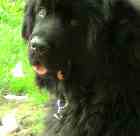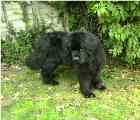Newfoundland Dog Health Issues
Your Newfoundland Dog health is an important factor to consider when you set out to share your life with this beautiful dog.
He may look robust, but the fact is that all large dog breeds are prone to certain conditions, which you must watch out for.
Newfoundland Puppies
Your puppy will need vaccinations against some nasty diseases before he can be let on the ground where other dogs may have been. If introducing a puppy into a home where there is already an older dog, make sure that the adult dog has his vaccinations up to date. Outside is different, as you have no idea what dogs have been there before.
Your puppy must be vaccinated at between seven and eight weeks of age, whilst he still carries some immunity from his mother. Many breeders will give the first vaccination before the puppy goes to his new home, but you must make sure that this has been done. If you are collecting your puppy at eight weeks however, it is not unusual for the breeder to expect you to arrange all vaccinations. You will need to carry him into the vets to protect him and be sure to tell the vet that it is a first vaccination.
Vaccinations need to include canine parvovirus, canine hepatitis, leptospirosis, canine distemper (also known as hard pad) and kennel cough.
If you do not live in one of the countries that have eliminated the disease, you should also have your puppy vaccinated against canine rabies.
Your puppy's second vaccination should be carried out two weeks later, at the age of ten weeks, and it should be a further week before you can safely take him outside.
If you have bought an older puppy, be sure he gets that first vaccination as soon as possible. After that, the same waiting periods apply in order to give the vaccination time to work.
It is a good idea to find a good vet before you get your puppy home. Ask your friends and neighbours who have animals what their vet is like. If you don't have that advantage, visit them all and ask to meet the vet in charge.
Unfortunately, not all vets are animal lovers. In my experience, a lot seem to be only in it for the money and you want someone who cares about your dog's welfare as much as you do.
Your puppy also needs to have flea treatment and to have been wormed. The first worming is usually done by the breeder, but do remember to ask.
Newfoundland puppies and adult dogs are particularly prone to heat stroke in the summer months. I nearly lost Joshua at only ten weeks old from heatstroke, yet he was only in the house with Ferdie. The symptoms of this started as him stumbling, vomiting, unable to drink. My vet saved his life and he wasn't too proud to ask advice from the vet school.
Newfoundland Dog Health - Adult Dogs
Your growing or adult dog can still be susceptible to canine hip dysplasia., even if his parents' hipscores are the best they can be. Remember that very little exercise should be the norm for a growing giant breed, but even an adult dog of this size can later develop hip or elbow dysplasia and you will need to watch out for signs of limping.
Subvalvular aortic stenosis is a heart disease for which Newfoundlands are particularly prone. You must have heart scan certificates from your breeder but if you do not, and even if you do, ask your vet to check for heart murmurs.
All giant dogs carry a risk of canine bloat, also known as gastric torsion, and care should be taken to prevent this. Do not exercise your dog, even a short walk, within one hour before or after eating. Your Newfoundland dog should be fed as an adult twice a day or even three times in smaller portions.
There is also a risk of early onset canine arthritis. Almost all large dogs will develop arthritis when they get old, but giant breeds can sometimes get this debilitating disease at a young age. Although it is not common in Newfoundlands, my Joshua was diagnosed with arthritis in his wrists at the age of only 19 months. I was very careful to limit his exercise whilst he was growing, but he contracted the illness anyway.
Special care must be taken with a growing puppy.
Supplements such as glucosomine and chondroitin, as well as Omega 3, are a great aid for alleviating joint problems. I have found from experience, though, that dog hydrotherapy has been the best treatment for Joshua's arthritis.



